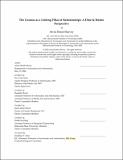The Cosmos as a Uniting Pillar of Relationships: A Diné & Hózhó Perspective
Author(s)
Harvey, Alvin Donel
DownloadThesis PDF (5.009Mb)
Advisor
Newman, Dava
Terms of use
Metadata
Show full item recordAbstract
Outer space is a shared ancestral environment of unbounded cultural value to humanity. Representing a common past and molding a collective future, our ethics, philosophies, technologies, and dreams of living in the cosmos are having profound effects on our lives on Earth. As access to spaceflight increases, ancient philosophical questions as well as the ethics of our behaviors and designs are returning to guide narratives, strategies, methodologies, and methods in Aeronautics and Astronautics. These complex questions are woven into the central understanding and potential solutions to our greatest challenges of climate change, space travel, and regenerative – not just sustainable - systems. Enduring and sophisticated in their methods of observation, characterization, and design, are Indigenous Knowledge Systems, which have addressed these same challenges for eons. Cosmological, ontological, axiological, and epistemological differences and parallels between Western and Indigenous science and engineering are places of critical thought and shared growth. Wholistic approaches in weaving both, seeing and building from the best in each, are key to addressing shared challenges. To this effort, this thesis seeks to answer the question of how research partnerships between Indigenous people, the Knowledge they carry, and the field of Aeronautics and Astronautics be mutually beneficial and be guided by methodologies and methods that create and sustain such relationships for the addressment of shared challenges. Motivated by ethical and legal needs and by my community responsibility to challenge, enhance, and evolve the field of Aeronautics and Astronautics, I surmised that such a place of mutual benefit can be constructed through 1) drawing from experiences of Indigenous and Western astrophilosophies coming into conflict and building from such differences a shared astrophilosophy that leads to Indigenous astroecology and Indigenous engineering, 2) constructing an understanding of Indigenous Research Methodologies and Methods in Aeronautics in Astronautics, particularly on the bridging of the two epistemologies by a mixed method approach. This approach is further contextualized and constructed to be operationalized through my current understanding of Diné Research Methodologies and Methods. I contend that Indigenous Knowledge informing engineering practices can be centered, not integrated, in Aeronautics and Astronautics in ways that enable further research inquiry and application, and finally 3) through constructing principles of 3 gathering and meeting with Indigenous communities, examining prior experiences with pedagogy and andragogy that centers Indigenous Knowledge in research, and building from shared systems thinking and engineering to frame future work. Throughout this thesis, I center relationality, the shared Indigenous understanding and importance of good relationships with the universe, as a fundamental principle and process of engineering from an Indigenous paradigm. In a central pursuit of seeking the knowledge to be good relatives, this work contributes to a relational approach to collaboration and research and a reaffirmation that Indigenous Knowledge is science and engineering. From my Diné perspective, I offer this thesis as a practice of good relationality, K’é, in the seeking of Hózhó, the balance and beauty to live together through the relationships made with the cosmos.
Date issued
2024-05Department
Massachusetts Institute of Technology. Department of Aeronautics and AstronauticsPublisher
Massachusetts Institute of Technology